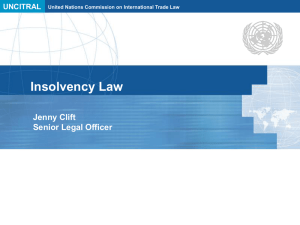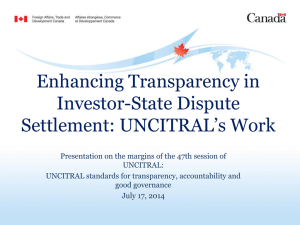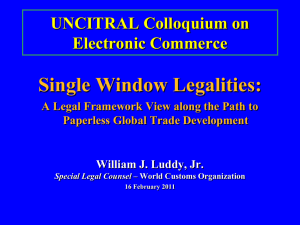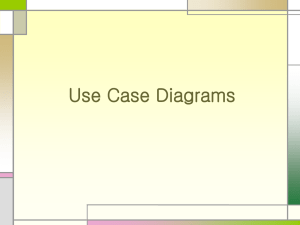Insolvency Office Holders Principles
advertisement
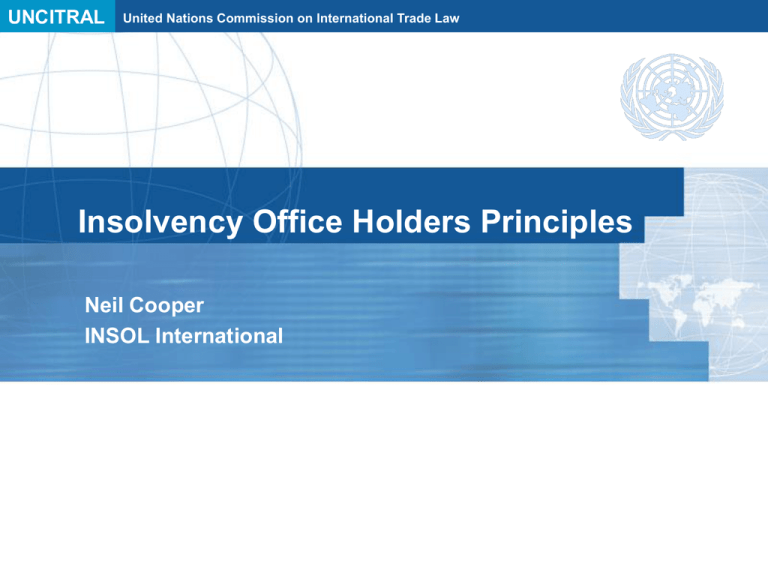
UNCITRAL United Nations Commission on International Trade Law Insolvency Office Holders Principles Neil Cooper INSOL International EBRD Insolvency Office Holders Principles Principle 1 - Qualifications and Licensing Generally Principle 2 - Appointment in an Insolvency Case Principle 3 - Review of Office Holder Appointment Principle 4 - Removal, Resignation and Death of Office Holder Principle 5 - Replacement of Office Holder Principle 6 - Standards of Professional and Commercial Conduct Principle 7 - Reporting and Supervision Principle 8 - Regulatory and Disciplinary Functions Principle 9 - Remunerations Principle 10 - Release of Office Holder Principle 11 - Insurance and Bonding Principle 12 - Code of Ethics UNCITRAL United Nations Commission on International Trade Law Principle 1 - Qualifications and Licensing Generally • An IOH should have fundamental qualifications including general ability and intelligence, experience, professional knowledge and good character • IOH should be regarded as professional body of persons and regulated by a system of licensing • The law or regulatory framework should provide: - the qualification of IOH - examination in insolvency law and practice and other relevant subjects - licensing or registration of candidates who satisfy qualification standards - register of licensed / registered IOH - requirement for continuing education for IOH - renewal of a license or registration - [licensing of a corporate body] UNCITRAL United Nations Commission on International Trade Law Principle 2 - Appointment in an Insolvency Case • There must be predictable and fair process for appointing IOH • The law should state: - grounds upon which IOH may be ineligible for appointment - body who may appoint IOH - where appointment is by court (or other relevant authority), clear guidelines for selection of IOH where appointment is by general body of creditors, manner in which appointments is made - where appointment is by debtor, the manner in which appointment is made no restriction on the number of cases in respect of which IOH may be appointed UNCITRAL United Nations Commission on International Trade Law Principle 3 - Review of IOH Appointment • Process for appointing IOH needs transparency and impartiality • Both creditors and debtors with an interest in who is appointed should have opportunity to oppose an appointment • Accordingly, law should facilitate review of appointment by: - providing grounds on which an appointment may be reviewed - providing process for review - if an appointment is set aside, providing for appointment of another qualified IOH UNCITRAL United Nations Commission on International Trade Law Principle 4 - Removal, Resignation and Death of an IOH • The parties in interest may wish to remove an IOH from office or an IOH may wish to retire from office or may die. • Accordingly, law should provide for: - resignation of IOH - grounds on which IOH may be removed - process for removal of IOH UNCITRAL United Nations Commission on International Trade Law Principle 5 - Replacement of an IOH • The process of a replacement of an IOH is important • Accordingly, where IOH dies, retires or is removed, law should provide: - for prompt appointment of new IOH to replace former IOH - that new IOH is entitled, without delay, to assets, books and records of former IOH - that retiring or removed IOH must co-operate with and assist new IOH in transfer and transmission of the conduct of case UNCITRAL United Nations Commission on International Trade Law Principle 6 - Standards of Professional and Commercial Conduct • Standards are essential for establishing and measuring the performance of IOH • Accordingly, the law should: by primary legislation, provide basic, fundamental standards critical to proper professional and commercial conduct by IOH - by secondary legislation, provide standards for: a) reports b) initial collection and safeguarding of assets c) trading of the debtor's business subsequent to opening proceedings d) keeping records e) convening and conduct of creditors meetings f) sale and operation of bank accounts g) opening and operation of bank accounts h) reorganisation plan contents and explanatory memorandum UNCITRAL United Nations Commission on International Trade Law Principle 7 - Reporting and Supervision • Creditors, debtor and others with interest in a case (including court or regulatory body) must be regularly informed about the progress of a case and that relevant information is available to them. This may be best facilitated through reports. This also provides a basis upon which the work of IOH and the progress of case may be monitored. • Accordingly, the law should provide: that IOH provide regular reports on the work undertaken and progress of the case - for a committee of creditors to oversee the IOH - that the performance of IOH be monitored UNCITRAL United Nations Commission on International Trade Law Principle 8 - Regulatory and Disciplinary Functions • The level of trust, responsibility and work standards required of an IOH requires commensurate regulation and discipline. • Accordingly, the law should: provide for a government or other body (including a recognised professional association) to have appropriate regulatory, investigatory and disciplinary powers in respect of IOH provide for the ground upon which the conduct of an IOH may be investigated UNCITRAL United Nations Commission on International Trade Law Principle 8 - Regulatory and Disciplinary Functions cont’d - provide for the regulatory body to have power to: a) investigate conduct of an IOH on referral by court, complaint of a third party or on its own motion b) intervene in proceedings concerning conduct or removal of IOH c) impose disciplinary measures for misconduct - provide that disciplinary powers include power to: a) fine b) suspend the license or registration c) terminate registration or license d) require IOH to compensate third parties e) require IOH to undergo further education and training UNCITRAL United Nations Commission on International Trade Law Principle 9 - Remuneration and Expenses • Reward : the level and determination of reward is critical • Accordingly, the law should provide: - for the entitlement to be remunerated for work done and to recover expenses - the remuneration may be determined by a court, relevant authority or other institution - the basis upon which the remuneration may be calculated - an appropriate mechanism for review of the remuneration - payment of remuneration out of the estate of the debtor - an appropriate level of priority ahead of other claims UNCITRAL United Nations Commission on International Trade Law Principle 10 - Release of Office Holder • The law should provide that, subject to any objection by a regulatory body or an interested party, an IOH may be released from his / her appointment in an insolvency case UNCITRAL United Nations Commission on International Trade Law Principle 11 - Insurance and Bonding • The law should require that an IOH must have professional indemnity insurance cover to protect third parties against negligence or breach of duty or fraud UNCITRAL United Nations Commission on International Trade Law Principle 12 - Code of Ethics • The law should encourage and facilitate the development of a code of ethics for IOH, preferably through a professional body UNCITRAL United Nations Commission on International Trade Law

